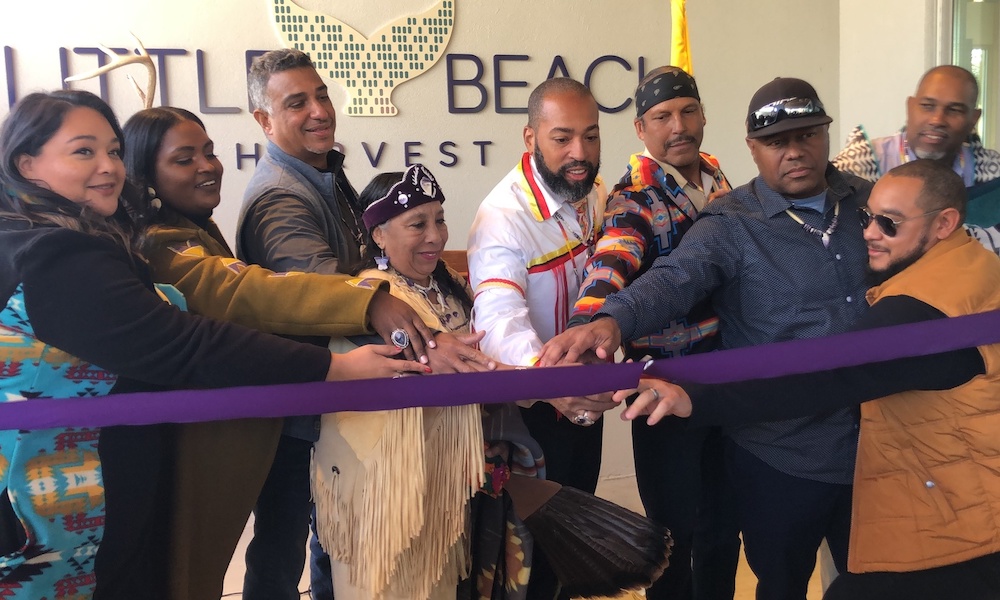
- Details
- By Chez Oxendine
- Finance
Native-owned cannabis businesses continue to blossom nationwide, but regulatory confusion threatens to stifle that growth. Complex intersections between tribal and state jurisdictions block many Native operations from accessing basic banking services.
According to marijuana trade publication MJ Business Daily, 57 Native-owned medical marijuana dispensaries and adult-use stores now operate nationwide as of May 2024 — a 25 percent increase since January 2023. Many of these tribal operations represent the first cannabis businesses in their respective states or early entries into emerging markets.
One such business is Little Beach Harvest Dispensary, a New York-based tribal enterprise of the Shinnecock Nation. Product Marketing Manager Jay Wright has been with Little Beach Harvest for about three years, and has watched the dispensary struggle to find consistent financial partners.
“We fell off with our funding partners in the beginning, and since then we’ve been in limbo,” Wright said. “We’ve had business partners and investors and such but nobody long term — it’s mainly been our dispensary and the Shinnecock Nation supporting each other in turn.”
Shinnecock Nation’s regulations mirror many of New York State’s rules, but differ in which taxes can be collected and how audits are conducted, Wright said.
“We follow the guidelines of New York State, but we do not adhere to all of them,” Wright said. “They want to be able to come onto our land to do an audit ... it would basically be stripping away our sovereignty if we allowed that.”
These muddled policy intersections between Shinnecock and New York State policy have created barriers for potential financial partners. Despite the challenges, Little Beach Harvest Dispensary has become a strong contributor to the tribe’s economic development strategy, but they need a banking partner to continue growing, Wright said. That’s what brought the dispensary’s management to Bonita Springs, Fla.-based financial technology firm Green Check.
Green Check has developed software that could expand banking access by allowing Native cannabis businesses to register using their own tribal regulations rather than forcing them to comply with state frameworks — a key barrier that has kept many financial institutions from working with tribes.
“We’re finding a lot of challenges and roadblocks along the way because of the lack of education some of the credit unions have around state laws, and tribal laws,” said Mary Jane Oatman, executive director of the Indigenous Cannabis Industry Association (ICA). “It is still a very risky area.”
The regulatory uncertainties compound existing barriers to credit access in Indian Country, making banks that much more skittish and leaving Native cannabis operators without startup or growth capital, she added.
 (L-R): Oatman, Litke“We were seeing a trend around a lack of comfort banking tribal owned cannabis companies, primarily because there’s not the same level of familiarity and transparency around the programs and rules behind them,” Green Check’s VP of financing and banking Services Stacy Litke told Tribal Business News. “We were hearing that over and over again. That doesn’t feel right to me.”
(L-R): Oatman, Litke“We were seeing a trend around a lack of comfort banking tribal owned cannabis companies, primarily because there’s not the same level of familiarity and transparency around the programs and rules behind them,” Green Check’s VP of financing and banking Services Stacy Litke told Tribal Business News. “We were hearing that over and over again. That doesn’t feel right to me.”
When tribes allow the sale of products that state law prohibits — full botanical hemp flower, for example — that can create roadblocks for banks to verify compliance. As a result, many banks have refused tribal cannabis business rather than navigate the complexity.
Green Check’s platform aims to address this by creating separate verification paths for tribal regulations, allowing banks to track compliance based on tribal law rather than state cannabis regulations. The fintech company is working with tribal regulators to build out and fine tune comprehensive rule sets for each sovereign nation’s cannabis program, Litke said.
These efforts to bridge the compliance information gap come at a critical time for tribal cannabis development, according to ICIA’s Oatman.
“Tribes are embracing sovereignty in the cannabis industry as an emerging multi-billion dollar forecast, but they’re doing it in a way that’s not as fast and fancy as what happened with gaming because there’s a lack of guidance,” Oatman said. “They don’t have that same infrastructure.”
It’s been roughly three months since Little Beach Harvest Dispensary began talking with Green Check about finding a banking partner. Wright is optimistic that a clearer line between New York and Shinnecock regulations could smooth over that process.
“I’m planning to have my general manager look into which banking systems would be a good fit for us,” Wright said. “We’re going to continue with our growth on an agricultural, financial, and community level.”
